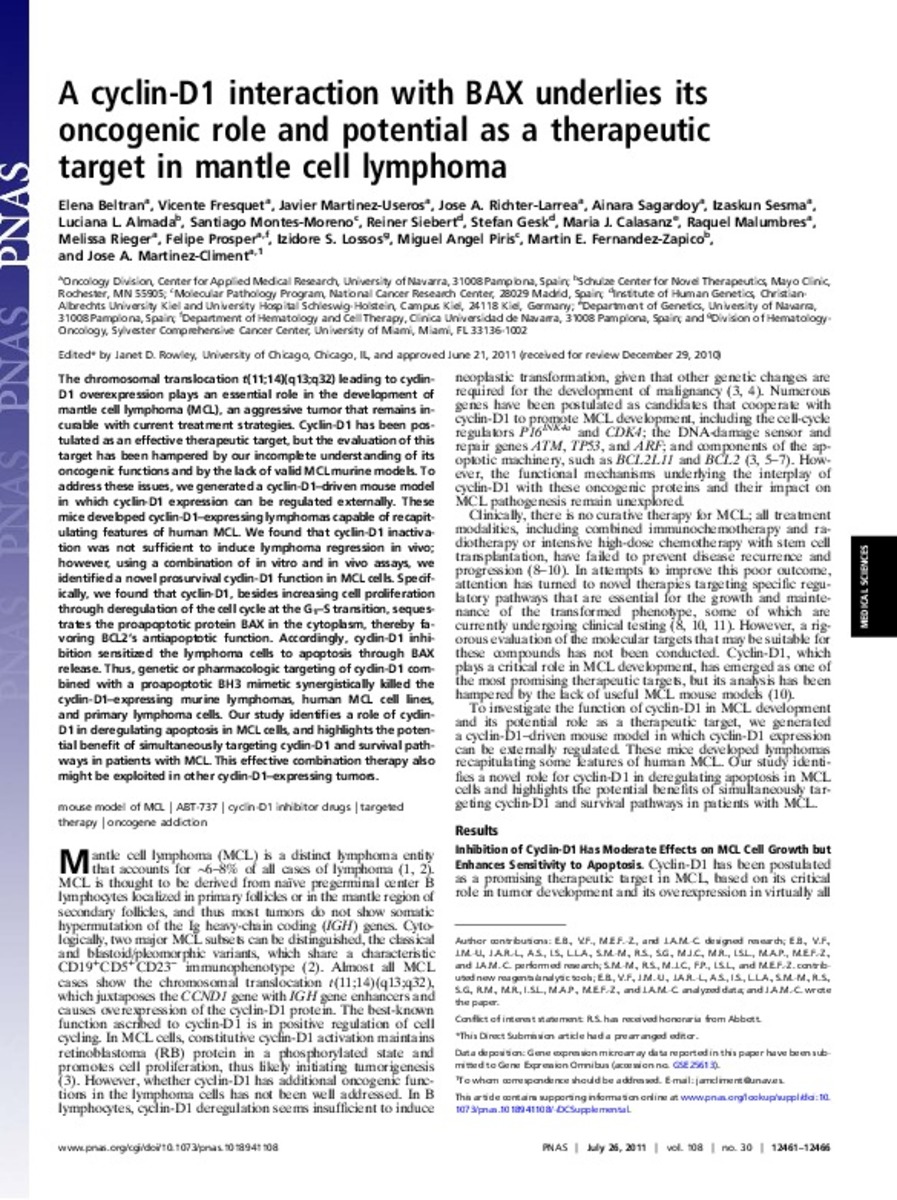Registro completo de metadatos
| Campo DC | Valor | Lengua/Idioma |
|---|---|---|
| dc.creator | Beltran, E. (E.) | - |
| dc.creator | Fresquet, V. (Vicente) | - |
| dc.creator | Martinez-Useros, J. (Javier) | - |
| dc.creator | Richter, J.A. (José Ángel) | - |
| dc.creator | Sagardoy, A. (Ainara) | - |
| dc.creator | Sesma, I. (Izaskun) | - |
| dc.creator | Almada, L.L. (Luciana L.) | - |
| dc.creator | Montes-Moreno, S. (Santiago) | - |
| dc.creator | Siebert, R. (Reiner) | - |
| dc.creator | Gesk, S. (Stefan) | - |
| dc.creator | Calasanz-Abinzano, M.J. (Maria Jose) | - |
| dc.creator | Raquel | - |
| dc.creator | Rieger, M. (Melissa) | - |
| dc.creator | Prosper-Cardoso, F. (Felipe) | - |
| dc.creator | Lossos, I.S. (Izidore S.) | - |
| dc.creator | Piris, M.A. (Miguel A.) | - |
| dc.creator | Fernandez-Zapico, M.E. (Martín E.) | - |
| dc.creator | Martinez-Climent, J.A. (José Ángel) | - |
| dc.date.accessioned | 2014-08-28T18:51:01Z | - |
| dc.date.available | 2014-08-28T18:51:01Z | - |
| dc.date.issued | 2011-07-26 | - |
| dc.identifier.citation | Beltrán E, Fresquet V, Martínez-Useros J, Richter-Larrea JA, Sagardoy A, Sesma I, et al. A cyclin-D1 interaction with BAX underlies its oncogenic role and potential as a therapeutic target in mantle cell lymphoma. Proc Natl Acad Sci U S A. 2011 Jul 26;108(30):12461-12466 | es_ES |
| dc.identifier.issn | 1091-6490 | - |
| dc.identifier.uri | https://hdl.handle.net/10171/36409 | - |
| dc.description.abstract | The chromosomal translocation t(11;14)(q13;q32) leading to cyclin-D1 overexpression plays an essential role in the development of mantle cell lymphoma (MCL), an aggressive tumor that remains incurable with current treatment strategies. Cyclin-D1 has been postulated as an effective therapeutic target, but the evaluation of this target has been hampered by our incomplete understanding of its oncogenic functions and by the lack of valid MCL murine models. To address these issues, we generated a cyclin-D1-driven mouse model in which cyclin-D1 expression can be regulated externally. These mice developed cyclin-D1-expressing lymphomas capable of recapitulating features of human MCL. We found that cyclin-D1 inactivation was not sufficient to induce lymphoma regression in vivo; however, using a combination of in vitro and in vivo assays, we identified a novel prosurvival cyclin-D1 function in MCL cells. Specifically, we found that cyclin-D1, besides increasing cell proliferation through deregulation of the cell cycle at the G(1)-S transition, sequestrates the proapoptotic protein BAX in the cytoplasm, thereby favoring BCL2's antiapoptotic function. Accordingly, cyclin-D1 inhibition sensitized the lymphoma cells to apoptosis through BAX release. Thus, genetic or pharmacologic targeting of cyclin-D1 combined with a proapoptotic BH3 mimetic synergistically killed the cyclin-D1-expressing murine lymphomas, human MCL cell lines, and primary lymphoma cells. Our study identifies a role of cyclin-D1 in deregulating apoptosis in MCL cells, and highlights the potential benefit of simultaneously targeting cyclin-D1 and survival pathways in patients with MCL. This effective combination therapy also might be exploited in other cyclin-D1-expressing tumors. | es_ES |
| dc.language.iso | eng | es_ES |
| dc.publisher | National Academy of Sciences | es_ES |
| dc.rights | info:eu-repo/semantics/openAccess | es_ES |
| dc.subject | Cyclin D1 | es_ES |
| dc.subject | Lymphoma, mantle-cell | es_ES |
| dc.subject | BAX protein, human | es_ES |
| dc.subject | Antineoplastic agents | es_ES |
| dc.subject | Disease models, animal | es_ES |
| dc.title | A cyclin-D1 interaction with BAX underlies its oncogenic role and potential as a therapeutic target in mantle cell lymphoma | es_ES |
| dc.type | info:eu-repo/semantics/article | es_ES |
| dc.identifier.doi | http://dx.doi.org/10.1073/pnas.1018941108 | es_ES |
Ficheros en este ítem:
Estadísticas e impacto
Los ítems de Dadun están protegidos por copyright, con todos los derechos reservados, a menos que se indique lo contrario.






